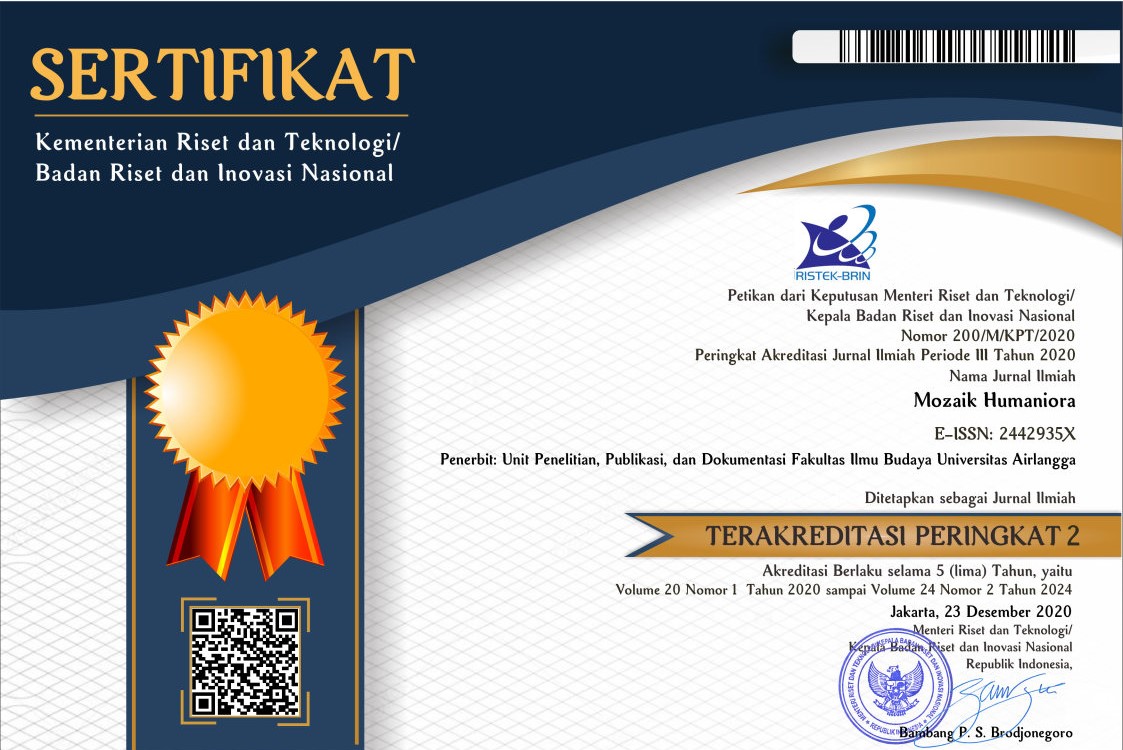Komunitas Sastra, Produksi Karya, dan Pembangunan Karakter
Downloads
Ang, Soon, and Damien Joseph. 1996. "Organizational Learning and Learning Organization: Trigger Events, Process, and Structures.” In The Academy of Management Meetings. Ohio: Cincinnati.
Escaprit, Robert. 2005. Sosiologi Sastra. Jakarta: Yayasan Obor Indonesia.
Faruk. 1994. Pengantar Sosiologi Sastra: Dari Strukturalisme sampai Post-Modernisme. Yogyakarta: Pustaka Pelajar.
Hall, John.1979. The Theory of Sociology Literature. London and New York: Longman.
Manuaba, Ida Bagus Putera, Trisna Kumala Satya Dewi, dan Adi Setijowati. 2014. "Etnopuitika Karya Sastra Indonesia Sastrawan Jawa Timur: Kajian Holistik Sosiologi Sastra.” Surabaya: Universitas Airlangga.
________. 2016. "Optimalisasi Pengelolaan Komunitas Sastra dan Budaya Literasi: Studi Manajemen Komunitas, Kreator, dan Produktivitas Sastra.” Surabaya: Universitas Airlangga.
Manuaba, Ida Bagus Putera, I Ketut Sudewa, dan Adi Setijowati. 2017”2018. "Menggali Model Manajemen Organisasi Komunitas Sastra untuk Meningkatkan Produksi Sastra Menuju Pembangunan Karakter Bangsa.” Surabaya: Universitas Airlangga.
Milles and Huberman. 1992. Qualitative Research Method. England: Blackwell.
Ratna, Nyoman Kutha Ratna. 2003. Paradigma Sosiologi Sastra. Yogyakarta: Pustaka Pelajar.
Sumodiningrat, Gunawan. 2015. "Pemberdayaan Masyarakat Berbasis UVOP (One Village One Product) sebagai Solusi Kerja Sama ada Era MEA (Masyarakat Ekonomi ASEAN) Menggunakan Bahasa dan Budaya Indonesia/Melayu sebagai Alat Pemersatu.” Seminar Internasional "Tantangan Bahasa dan Sastra Indonesia/Melayu pada Era Masyarakat Ekonomi ASEAN (MEA). Yogyakarta.
Swingewood, Alan and Diana Laurenson.1972. Sociology of Literature. London: Paladin.

Mozaik Humaniora is licensed under a Creative Commons Attribution-ShareAlike 4.0 International License. Both authors and Mozaik Humaniora agree with the following attribution of journal:
1. Copyright of this journal is possession of Author, by the knowledge of the Editorial Board and Journal Manager, while the moral right of the publication belongs to the author.
2. The journal allows the author(s) to retain publishing rights without restrictions
3. The legal formal aspect of journal publication accessibility refers to Creative Commons Attribution Share-Alike (CC BY-SA).
4. The Creative Commons Attribution Share-Alike (CC BY-SA) license allows re-distribution and re-use of a licensed work on the conditions that the creator is appropriately credited and that any derivative work is made available under "the same, similar or a compatible license”. Other than the conditions mentioned above, the editorial board is not responsible for copyright violation.


















